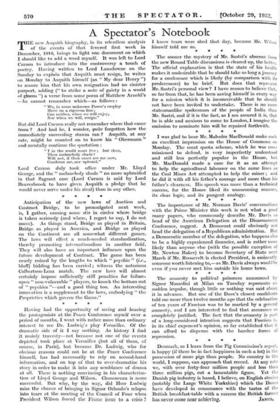A Spectator's Notebook
THE new Asquith biography, in its relentless analysis of the events of that fevered first week in December, 1916, brings to light one document on which I should like to add a word myself. It was left to Lord Curzon to introduce into the controversy a touch of poetry. Having written to Lord Lansdowne on the Sunday to explain that Asquith must resign, he writes on Monday to Asquith himself (as " My dear Henry ") to assure him that his own resignation had no sinister purport, adding (" to strike a note of gaiety in a world of gloom ") a verse from some poem of Matthew Arnold's —he cannot remember which—as follows :
" We, in some unknown Power's employ Move on a rigorous lino Can neither, when we will enjoy, Nor when we will, resign."
But did Lord Curzon really not remember where that came from ? And had he, I wonder, quite forgotten how the immediately succeeding stanza ran ? Asquith, at any rate, might be counted on to know his " Obermann " and mentally continue the quotation : " I in the world must live ; but thou, Thou melancholy shade !
Wilt not, if thou cant see me now, Condemn me, nor upbraid."
Lord Curzon duly took office under Mr. Lloyd George, and the " melancholy shade " no more upbraided in that flagrant case (Lord Curzon is said by Lord Beaverbrook to have given Asquith a pledge that he would never serve under his rival) than in any other.












































 Previous page
Previous page